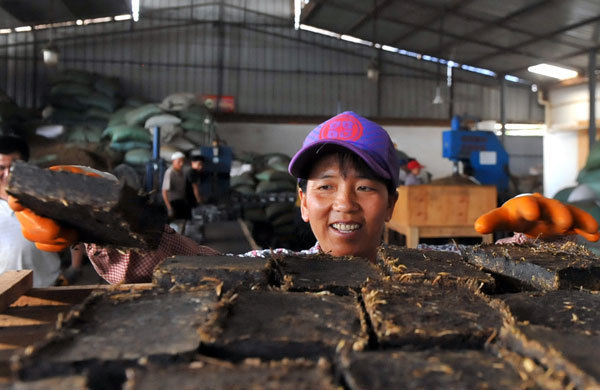
A worker checks bricks of compressed tea at a factory in Menghai county, Yunnan province, on May 19. The province is a major tea producer and boasts a few national names such as Pu'er. Chen Haining / Xinhua
Promotion and marketing vital to win global fame, specialists say
Coffee or tea?
That is the question diners are often asked.
Many Westerners are likely to choose coffee, while Chinese prefer tea.
But a few foreign tea experts believe tea could become increasingly popular at dinner tables around the world.
Promotion and marketing would be the key, said experts attending the 2013 International Tea Conference in Pu'er, Yunnan province, over the weekend.
The value of the beverage is well recognized in China, but not so globally.
This can be shown by production, according to Norman Kelly, president of the International Tea Committee.
Global tea production has grown 3 percent annually over the past five years, but Chinese tea has been growing 10 percent on average to maintain the nation's status as the world's biggest producer, he said.
This year, the price of Pu'er tea, a hugely popular tea produced mostly in Yunnan, almost doubled from last year in China, because of severe drought in the province for four consecutive years.
However, Pu'er tea is little known in Western markets such as the United States and Canada.
British, Japanese and Indian teas are popular in the international market. Some of their popular teas sell for nine times the price of Chinese teas, said Shen Peiping, deputy governor of Yunnan and president of the Chinese Pu'er Tea Research Institute.
Louise Roberge, president of the Tea Association of Canada, said this is not caused by a difference in quality, but mainly by branding and marketing.
She has been to China many times since 1985 and is fond of the elegantly made tea at local restaurants. However, in Canada, people have the impression that Chinese teas are of poor quality, she said.
Roberge suggested China create promotional materials to educate consumers in French- and English-speaking countries and regions. Tea shows are also a good place to exhibit Chinese products, she said.
